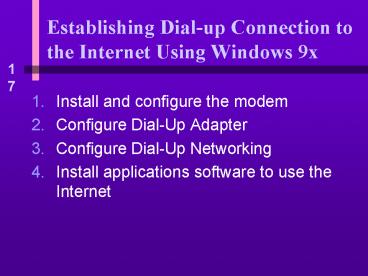Establishing Dialup Connection to the Internet Using Windows 9x - PowerPoint PPT Presentation
Title:
Establishing Dialup Connection to the Internet Using Windows 9x
Description:
Uses network file service (NFS) software to make one PC appear to have a new hard drive ... Files and folders on host computer are available even to network ... – PowerPoint PPT presentation
Number of Views:111
Avg rating:3.0/5.0
Title: Establishing Dialup Connection to the Internet Using Windows 9x
1
Establishing Dial-up Connection to the Internet
Using Windows 9x
- Install and configure the modem
- Configure Dial-Up Adapter
- Configure Dial-Up Networking
- Install applications software to use the Internet
2
Configuring Dial-Up Networking
3
Configuring Dial-Up Networking
4
Cable Modem and DSL Connections to the Internet
- Cable modem
- Provided by service provider
- Has a connection to the TV cable system of your
home that connects to the ISP and an Ethernet
port to connect to your PC - Ethernet cable connects the cable modem to a
network card installed in your PC - DSL
- A device sits next to your PC, which connects to
the DSL line on one side and to a network card
installed in your PC on the other side
5
Examples of Network Services
- Most function at top three layers of the OSI
model application, presentation, and session
layers - Must be a program running on both nodes of the
network for the service to work
6
Upper-level Protocols
- Hypertext Transfer Protocol (HTTP)
- Used by the World Wide Web
- File Transfer Protocol (FTP)
- Used to transfer files
- Simple Mail Transfer Protocol (SMTP)
- Used to transfer e-mail
7
Uniform Resource Locator (URL)
8
World Wide Web Browsers
- Provide interface between Web sites and PCs
- Access a server by either its IP address or its
domain name - Use HTTP to request and pass documents on the Web
- Terminology
- Hypertext
- HTML
9
File Transfer
- File Transfer Protocol (FTP)
- Used to transfer files between two computers
using same or different OS - Can be initiated at a command prompt or using an
ISP
10
File Transfer from a Command Prompt
11
File Transfer Using FTP Software
12
File Transfer Using FTP Software
13
Network Drive Map
- One of most powerful and versatile methods of
communicating over a network - Uses network file service (NFS) software to make
one PC appear to have a new hard drive - Files and folders on host computer are available
even to network-unaware DOS applications
14
Preparing a Windows NT Host Computer for a
Network Drive Map
15
Preparing a Windows NT Host Computer for a
Network Drive Map
16
Preparing a Windows NT Host Computer for a
Network Drive Map
17
Mapping the Network Drive from a Remote to a Host
Computer
18
Mapping the Network Drive from a Remote to a Host
Computer
19
Mapping the Network Drive from a Remote to a Host
Computer
20
Linux Operating System
- Well-suited to support web servers, FTP servers,
and file servers - A UNIX-like operating system can use more than
one shell
21
Linux System Administrator
- Installs updates to the OS (patches)
- Manages backup processes
- Supports installation of software and hardware
- Sets up user accounts
- Resets passwords
- Generally supports users
- Has root privileges
22
Linux Operating System
23
continued
24
UNIX Commands
25
Managing Processes
- To initiate a process to run in the background,
enter the name of the process at the command
prompt followed by - Linux starts the process and responds with a
number (the process identifying number, or PID) - To stop a process, use the kill command
26
Windows Manager
- Several applications have been written to provide
a GUI shell for UNIX and Linux these shells are
called X Windows
27
A Typical X Window Screen
28
Major Components of a GNOME Windows
29
Network Troubleshooting Guidelines
- Windows 9x dial-up problems (modem problems)
- Cannot make a connection
- You can connect, but you get the message Unable
to resolve hostname - After connecting, you get the error message
Unable to establish a compatible set of network
protocols - Problems with TCP/IP
- Problems with TCP/IP configuration or suspected
network problems (packet Internet groper or PING)
30
Chapter Summary
- Fundamentals of the hardware and software that
make up networks - How to support a PC that interfaces with the
Internet































